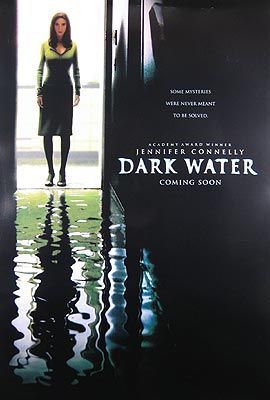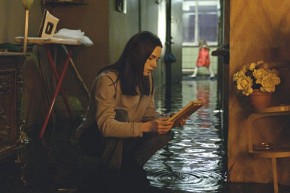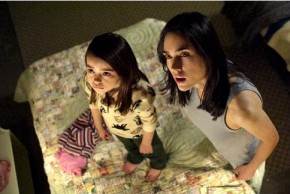|
Dark
Water
There have been many adaptations of Japanese horror films
of late, and their continued success only seems to encourage
studios to continue with the trend of buying up the US distribution
rights of the original films, shelving them, and remaking
them with an “American spin” to better suit
US audiences.
Wes
Craven had been circling a remake of one of my favorite
Japanese horror films, Kiyoshi Kurosawa’s Kairo,
for some time now, and when it was finally canned there
were sighs of relief echoing throughout the halls of Fanboy
Planet -- though that may be unrelated.
Those
cries of joy have turned into whimpers of pain, as it appears
that the US remake is in production yet again, and filming
as we speak, under the new title Pulse with Jim
Sonzero at the helm.
Let’s
digress from this digression. Dark Water, the latest
entry into the “remake genre” originated with
Hideo Nakata, whose film Ringu kicked off the recent
trend when its US incarnation, the Gore Verbinski helmed
The Ring, broke the
box office wide open. Studio executives sat up and took
note of its success and immediately began green lighting
other Japanese horror films.
To sit
and compare this current adaptation to the original film,
Honogurai mizu no soko kara, would be futile. These
remakes always take liberty with the source material, bending
it and shaping it to better suit what will hopefully equate
to box office gold. However, it’s strangely ironic
that Dark Water originated with Hideo Nakata, because
unlike Verbinski’s stylistic adaptation of The
Ring, Walter Salles’ adaptation of Nakata’s
film seems to hold truer to the basic thematic elements
of Japanese horror than any of its predecessors.
For
that very reason, this film will polarize audiences, and
ultimately be dismissed.
It is
true that Japanese horror films have contained some of the
creepiest imagery of late, and their horror/thriller elements
have somewhat rejuvenated American horror, which was quickly
becoming stifled by relentless parody. However, creepy scenes,
believe it or not, do not make a quality horror film. There
has to be something more going on behind all of the eeriness
and bloodshed, and Salles captures this perfectly.
The
real conflict in Japanese horror films always seems to coincide
with supernatural events. These supernatural events are
no coincidence, mind you, as they are intended to be viewed
as extended metaphor, playing of the strife and complications
occurring between the characters within the film.
With
Dark Water we are introduced to Dahlia (Jennifer
Connelly), a woman whom has suffered a significant amount
of trauma throughout her childhood, namely child abandonment
in the realm of physical and mental abuse. Dahlia’s
past is directly tied to her future, as she is in the midst
of a nasty divorce with her husband, Kyle (Dougray Scott),
and caught the middle of the feud is their daughter, Ceci
(Ariel Gade). Both Dahlia and Kyle are working to establish
a joint custody scenario for Ceci, but their differences
of opinion deter this from happening at every turn.
The
interesting development here is that we know that both Dahlia
and Kyle are separating for their own individual reasons,
but whether or not each individual reason is the proverbial
“right” reason is left unknown. Like many divorces,
each party feels justified in their actions, and each party
feels wronged by the other party. It’s only natural,
and the film reflects this development perfectly. When Kyle
accuses Dahlia of being crazy, we can see evidence of his
accusation, although we still side with her. When Kyle is
accused of being a cheater, his response seems quelled as
if there may be some truth to this, although this is never
really stated for fact.
This
blurred line keeps the focus on the present, not the past.
Well, for the audience at least. Dahlia’s fixation
with her past continually pulls her further and further
into darkness. On the exterior, she appears to be losing
grip of reality and behaving erratically, both signs pointing
to Kyle’s original assessment.
Dahlia’s
decision to put her daughter first in her life is admirable,
as we have all taken experiences from our past and sworn
to “right these wrongs” with our own actions
through adulthood. Relocating to Roosevelt Island, Dahlia
is able to find an affordable apartment that suits both
her and Ceci in the barest of necessities, and at the same
time serves as convenience, as it is only two blocks away
from one of the best schools in Ceci’s age bracket.
Connelly
plays wounded like a pro, and no one would doubt her convictions
here. As elements of the supernatural begin to manifest,
we are presented with reasoning for their dismissal that
not only suits the environments, but also refrains from
insulting viewers’ intelligence. The haunting of Dahlia
and Ceci’s apartment will feel reminiscent of other
films in this genre, which will likely turn many away from
the film initially. Yet it’s the manner in which these
aspects reflect the larger canvas that makes the film work
so well.
Rating:

|








